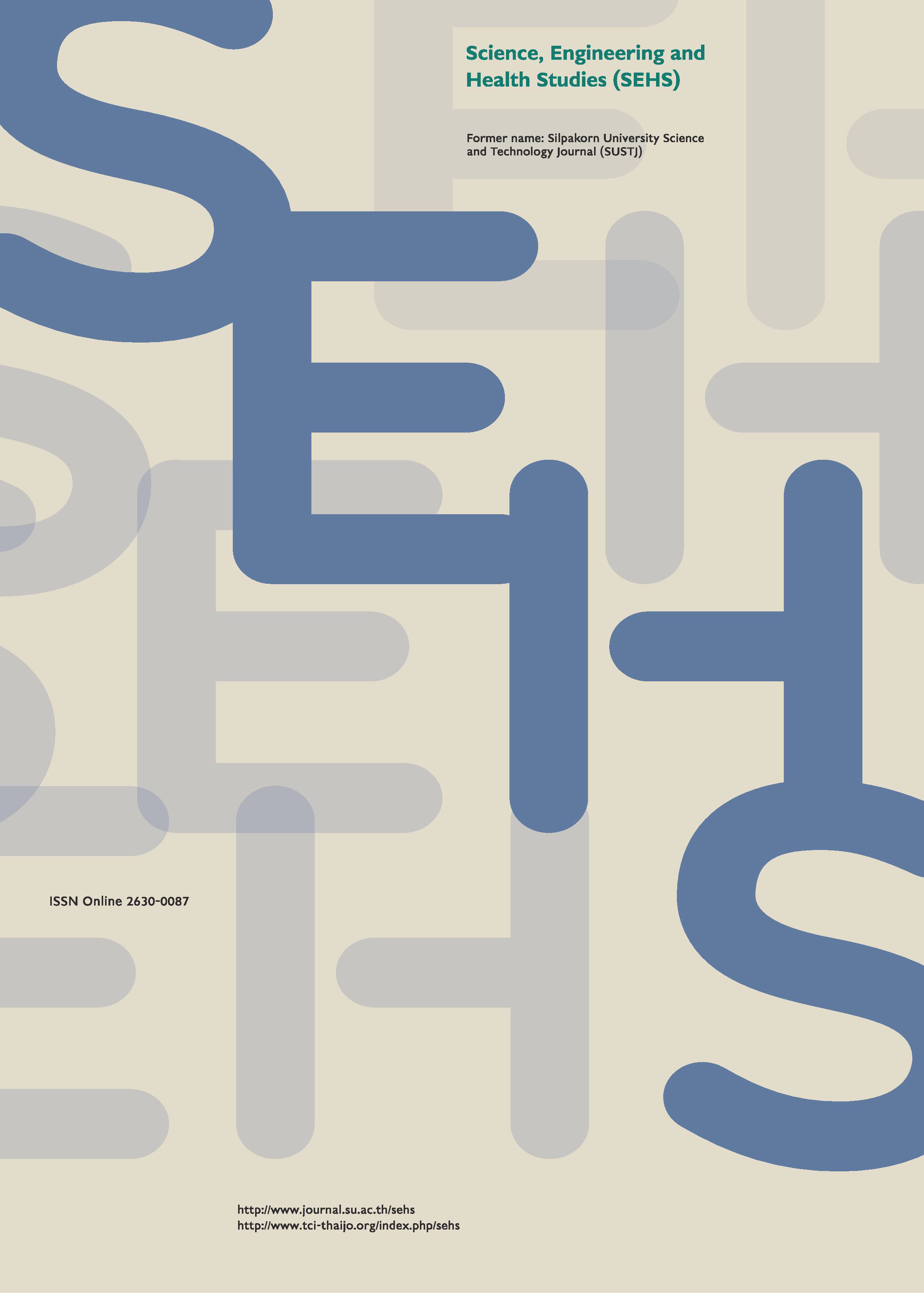Factors related to the detection of adulteration with pharmaceutical substances in food products claiming weight loss or sexual-performance enhancement
Main Article Content
Abstract
This cross-sectional analytical study aimed to determine factors related to the detection of adulteration with pharmaceutical substances in food products that claimed to reduce weight or enhance sexual performance. Data were collected using a survey checklist and descriptive statistics, and multiple logistic regression was applied for data analysis. Pharmaceutical substances were detected in 36.7% of food products. According to multiple logistic regression analysis, the factors significantly correlated with the detection of weight reducing or sexual-performance enhancing pharmaceutical substances in food products were the absence or miscommunication of ingredient information and indication claiming statements. The indication claiming statements significantly correlated to adulteration with weight reducing compounds in food products. In addition, the absence or miscommunication of ingredient information and the expiration date was associated with the finding of sexual performance enhancing drugs. These results could benefit the concerned department as educational information for raising consumer awareness before deciding to buy food products.
Downloads
Article Details

This work is licensed under a Creative Commons Attribution-NonCommercial-NoDerivatives 4.0 International License.
References
Ahmed, N., Nounou, M. I., Abouelfetouh, A., and El-Kamel, A. (2019). Over the counter herbal weight loss supplements in Egypt: label claim, microbiological and pharmaceutical quality, and safety assessments. Medical Principles and Practice, 28(2), 167-177.
Bujang, N. B., Chee, C. F., Heh, C. H., Rahman, N. A., and Buckle, M. J. (2017). Phosphodiesterase-5 inhibitors and their analogues as adulterants of herbal and food products: analysis of the Malaysian market, 2014-16. Food Additives & Contaminants: Part A, 34(7), 1101-1109.
Campbell, N., Clark, J. P., Stecher, V. J., Thomas, J. W., Callanan, A. C., Donnelly, B. F., Goldstein, I., and Kaminetsky, J. C. (2013). Adulteration of purported herbal and natural sexual performance enhancement dietary supplements with synthetic phosphodiesterase type 5 inhibitors. The Journal of Sexual Medicine, 10(7), 1842-1849.
Ching, C. K., Chen, S. P. L., Lee, H. H. C., Lam, Y. H., Ng, S. W., Chen, M. L., Tang, M. H. Y., Chan, S. S. S., Ng, C. W. Y., and Cheung, J. W. L. (2018). Adulteration of proprietary Chinese medicines and health products with undeclared drugs: experience of a tertiary toxicology laboratory in Hong Kong. British Journal of Clinical Pharmacology, 84(1), 172-178.
Czepielewska, E., Makarewicz-Wujec, M., Różewski, F., Wojtasik, E., and Kozłowska-Wojciechowska, M. (2018). Drug adulteration of food supplements: A threat to public health in the European Union?. Regulatory Toxicology and Pharmacology, 97, 98-102.
Dastjerdi, A. G., Akhgari, M., Kamali, A., and Mousavi, Z. (2018). Principal component analysis of synthetic adulterants in herbal supplements advertised as weight loss drugs. Complementary Therapies in Clinical Practice, 31, 236-241.
Dickinson, A., Blatman, J., El-Dash, N., and Franco, J. C. (2014). Consumer usage and reasons for using dietary supplements: report of a series of surveys. Journal of the American College of Nutrition, 33(2), 176-182.
Eichner, A., and Tygart, T. (2016). Adulterated dietary supplements threaten the health and sporting career of up and coming young athletes. Drug Testing and Analysis, 8(3-4), 304-306.
Ekar, T., and Kreft, S. (2019). Common risks of adulterated and mislabeled herbal preparations. Food and Chemical Toxicology, 123, 288-297.
Food Act (1979). [Online URL: https://www4.fisheries.go.th/local/file_document/20200410104310_1_file.pdf] accessed on April 16, 2022.
Hachem, R., Assemat, G., Martins, N., Balayssac, S., Gilard, V., Martino, R., and Malet-Martino, M. (2016). Proton NMR for detection, identification and quantification of adulterants in 160 herbal food supplements marketed for weight loss. Journal of Pharmaceutical and Biomedical Analysis, 124, 34-47.
Huang, H. H., Wen, Y. W., and Chen, H. H. (2017). Detection of false online advertisements with DCNN. In Proceedings of the 26th International Conference on World Wide Web Companion, pp. 795-796. Taipei, Taiwan.
Hys, K. (2020). Identification of the reasons why individual consumers purchase dietary supplements. In Perspectives on Consumer Behaviour (Sroka, W., ed.), pp. 193-209. Switzerland: Springer.
Koncz, D., Tóth, B., Roza, O., and Csupor, D. (2021). A systematic review of the European rapid alert system for food and feed: tendencies in illegal food supplements for weight loss. Frontiers in Pharmacology, 11, 2465.
Lee, J. H., Park, H. N., Park, O. R., Kim, N. S., Park, S. K., and Kang, H. (2019). Screening of illegal sexual enhancement supplements and counterfeit drugs sold in the online and offline markets between 2014 and 2017. Forensic Science International, 298, 10-19.
Rocha, T., Amaral, J. S., and Oliveira, M. B. P. (2016). Adulteration of dietary supplements by the illegal addition of synthetic drugs: a review. Comprehensive Reviews in Food Science and Food Safety, 15(1), 43-62.
Vaale-Hallberg, M. (2012). Does industry mislead the consumers? European Food and Feed Law Review, 7(5), 288-289.


